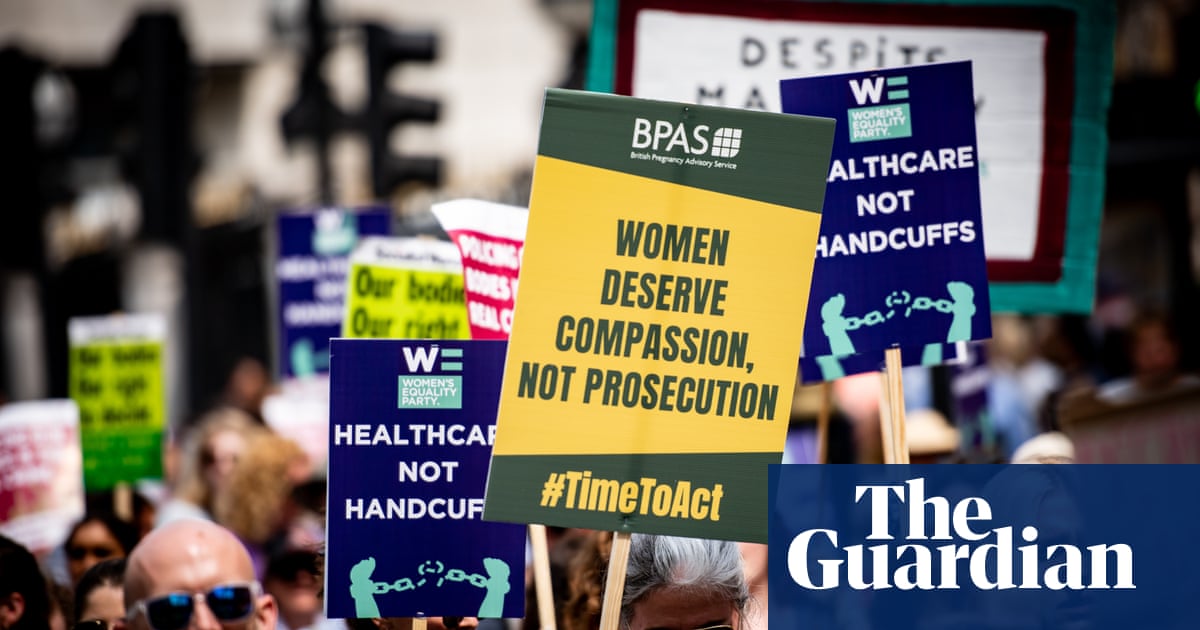MPs are expected to vote on whether to decriminalise abortion this summer, with two Labour backbenchers to put forward amendments to government legislation to change the law.
The Labour MPs Tonia Antoniazzi andStella Creasyare believed to be putting forward separate amendments.
For six decades, abortion in England and Wales has been largely governed by theAbortionAct 1967, which has allowed women to end their pregnancies under medical supervision up to 24 weeks, or beyond in certain circumstances, such as if the life of the mother is at risk or if the foetus has a serious abnormality.
In 2020, emergency legislation introduced during the Covid pandemic brought in telemedicine and with it the biggest shake-up in abortion provision since 1967. Instead of women seeking an abortion in the first 10 weeks of pregnancy needing to take the first pill under medical supervision, they couldreceive both pills by post after a remote consultation. It wasmade permanent in 2022, with MPs voting 215 in favour to 188 against.
However, inducing a miscarriage remains a crime, punishable with up to life in prison, and in recent years several women have found themselves in the dock for ending their own pregnancies outside the strict legal parameters of the 1967 act.
According to freedom of information data from theCrown Prosecution Service, 13 people made a first appearance at magistrates court charged with abortion-related offences in 2022. This had risen from four people in 2019 and three in each of 2020 and 2021. The numbers include both men and women.
Separate data, from about half Britain’s police forces, showed at least 11 people were arrested in 2023 onsuspicion of child destructionor inducing a miscarriage, including a 31-year-old woman in north Wales “reported to have taken illicit substances to initiate an abortion”.
One woman is now on trial at Isleworth crown court, with the prosecution alleging she knew herself to be beyond the time limit when she obtained abortion pills by post during lockdown.
In June 2023, Carla Foster was sentenced to 28 months in prison for terminating a pregnancy between 32 and 34 weeks. She had obtained pills after a remote consultation during lockdown, which were supplied in good faith.
A month later,her sentence was reducedto 14 months and suspended. Sitting at the court of appeal, Dame Victoria Sharp said it was “a case that calls for compassion, not punishment”.
Until 2022, it is believed that only three women had been convicted of having an illegal abortion in the 150 years since the introduction of the Offences Against The Person Act 1861, under which illegal abortions are most commonly prosecuted.
In the last parliament, MPs had put forward proposals to change the law under the criminal justice bill, with Labour MPs Diana Johnson and Creasy both proposing different changes to the law. However, the plans, along with the legislation, fell by the wayside with last summer’s general election.
Now a Home Office minister, Johnson can no longer table amendments to government legislation. Antoniazzi’s amendment is believed to be similar in scope to the one put forward by Johnson in the last parliament.
It is the second so-called vote of conscience MPs will walk through the voting lobbies in quick succession, with assisted dying legislation expected to come before the Commons prior to any abortion vote.
In a referendum in 2018,Ireland made abortion legalon request up to 12 weeks, and later if the foetus would be likely to die before or shortly after birth or if there is a risk of death or serious harm to a pregnant woman.
In 2019, Northern Ireland’s abortion laws were also modernised, allowed up to 12 weeks and later under limited circumstances.
However, in the United States, change has gone in the opposite direction. In June 2022, the supreme court ruled that there isno constitutional right to abortion, with the laws now decided at state level. About 22 million women of reproductive age have had access restricted, with abortion banned in more than a dozen states.
Heidi Stewart, the chief executive of the British Pregnancy Advisory Service (BPAS), said: “BPAS, alongside a coalition of royal colleges, medical bodies and women’s rights groups, are calling on MPs to reform our archaic abortion law and end the prosecution of women accused of ending their own pregnancies. We fully supported the amendment tabled by Diana Johnson MP to the criminal justice bill in 2024 and we hope that this parliament will take these proposals forward as a matter of urgency.”
